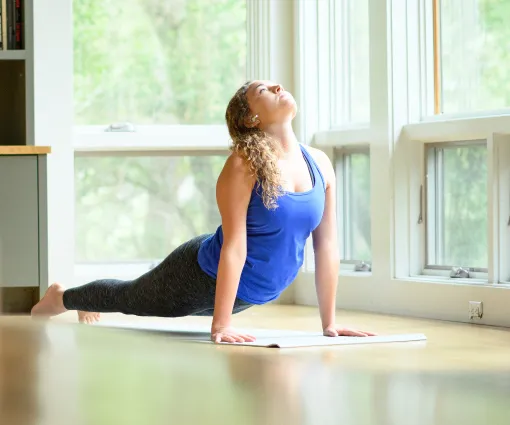Energy Efficient Heating: How to Heat Your Home Efficiently
4 minute read
Cooler temperatures are setting in all across the United States. As your thermostat kicks in to combat the winter chill, how can you balance the efficiency of your home’s heating system and the comfort of you and your family? AprilAire is here to answer some of your most common winter home heating questions.
What should I know before turning on my heating systems this winter?
If you haven’t serviced your home’s heating system since last year, there are a couple of tasks you’ll want to tackle before turning on the heat.
Start by replacing your air filters. Traditional 1” filters should be replaced every 1–3 months, while AprilAire Air Filters should be replaced every 6–12 months depending on the model.
For homes with a wood or pellet stove that requires a chimney, be sure to check the vent and clean out any debris left over from the previous year. It’s also important to consider the type of fuel you’re burning and how well the area is ventilated. If you want to protect your Indoor Air Quality, you might also consider installing an AprilAire Whole-House Air Purifier.
Additionally, make sure to check that your carbon monoxide detectors are working.
What’s the optimal indoor temperature during the winter?
When it comes to the perfect indoor temperature for the winter, it’s really a matter of preference, but a common temperature setting for the winter is 68°F. If you’re comfortable layering up and wearing warmer clothing while you’re relaxing at home, you can always keep the thermostat set a few degrees cooler to save money with energy efficient heating.
For even more energy cost savings, you can set your AprilAire Whole-House Thermostat to a lower temperature when you’re sleeping or away from the house. The U.S. Department of Energy says you can save as much as 10% a year on heating by turning your thermostat down 7°–10°F from its normal setting for 8 hours a day.
How can I check the insulation of my home and ensure I’m not losing heat?
Making sure your home is properly insulated for winter helps with energy efficient heating, saving you money on energy costs. One area where your home may be losing heat is through drafty doors and windows. On a good chilly, breezy day, you can feel around your exterior windows and doors to feel for any drafts. This gives you a great opportunity to see if adding weather stripping or additional sealing may be useful.
Once you’ve checked for drafty doors and windows, you’ll want to hire a trained technician or inspector to come and make sure your home is properly insulated. Typically older homes are more likely to need updates or improvements, and the U.S. Department of Energy has some tips to make the process easier.
How does relative humidity impact comfort levels in the winter?
There are several different benefits to keeping your home’s relative humidity balanced between 40–60 percent during the winter season.
First, it helps you stay healthy during the cold and flu season, as viruses thrive in excessively dry conditions. When you have balanced humidity levels, your sinuses and mucus membranes stay hydrated and will be better equipped to fight off airborne viruses and pollutants that are a threat to your health.
Next, controlling your relative humidity levels can protect the woodwork and paint in your home. Dry conditions can cause wood to split and paint to chip, but a consistent relative will help preserve these features year after year.
The third major benefit is that a healthy relative humidity can ease the burden on your winter home heating system. Moist air holds heat better than dry air, meaning you can keep your thermostat a few degrees lower and still feel comfortable in the winter. An AprilAire Whole-House Humidifier makes it easy to get these benefits in every room of your home.
Is the heated air in my home filtered to remove contaminants and allergens?
AprilAire Healthy Air Hero Paul Samek of Luxury Heating Company has some perspective on filtering the air in your home while your heating systems are engaged:
“Within the standard HVAC system, the fan only runs when the system is in heating or cooling mode. With a new HVAC system, whether it’s a gas furnace or an electric air handler, most have a true ECM motor that is going to continuously be filtering the air, regardless of whether it’s heating or cooling or not. Coupling that with a ventilation system and an AprilAire media air cleaner, it’s going to not only continuously be moving the air throughout the house and throughout the system, but it’s also going to be cleaning it—not just recycling it.”
Find more tips from Paul here.
How to Heat Your Home Efficiently With AprilAire
Maintaining your winter home heating is easy when you combine the AprilAire Whole-House Thermostats with help from your local AprilAire Healthy Air Professionals. With over 4,500 pros nationwide, AprilAire always has someone available to help you maintain your HVAC system and keep your relative humidity levels balanced for a comfortable winter season.



